Skip to main content
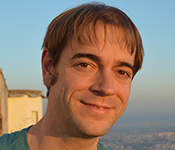 University of Washington professor Thomas Rothvoss, a member of the Allen School’s Theory of Computation group with a joint appointment in the UW Department of Mathematics, has received the 2023 Gödel Prize for “The matching polytope has exponential extension complexity.” In the paper, Rothvoss proved that linear programming — a core technique in combinatorial optimization for modeling a large class of problems that are polynomial-time solvable — cannot be used to solve the perfect matching problem in polynomial time. Read more →
University of Washington professor Thomas Rothvoss, a member of the Allen School’s Theory of Computation group with a joint appointment in the UW Department of Mathematics, has received the 2023 Gödel Prize for “The matching polytope has exponential extension complexity.” In the paper, Rothvoss proved that linear programming — a core technique in combinatorial optimization for modeling a large class of problems that are polynomial-time solvable — cannot be used to solve the perfect matching problem in polynomial time. Read more →
May 23, 2023
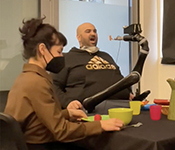 Few occasions better illustrate the human experience than sharing stories over a meal. Yet for people with motor impairments, the act of dining itself can invite undue pressure. Caregivers can get distracted while feeding their clients, who may feel self-conscious about interrupting the ongoing conversations to remind their caregiver to feed them a bite. A simple hangout with friends or family can turn into a source of potential embarrassment. The meal becomes more functional than social — and potentially, a process to be endured rather than a time for celebration.
That’s changing thanks to an innovative partnership between Allen School robotics researchers and the assistive technology nonprofit Tyler Schrenk Foundation. Read more →
Few occasions better illustrate the human experience than sharing stories over a meal. Yet for people with motor impairments, the act of dining itself can invite undue pressure. Caregivers can get distracted while feeding their clients, who may feel self-conscious about interrupting the ongoing conversations to remind their caregiver to feed them a bite. A simple hangout with friends or family can turn into a source of potential embarrassment. The meal becomes more functional than social — and potentially, a process to be endured rather than a time for celebration.
That’s changing thanks to an innovative partnership between Allen School robotics researchers and the assistive technology nonprofit Tyler Schrenk Foundation. Read more →
May 18, 2023
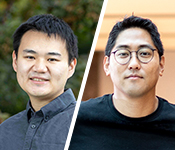 From natural disasters to cyberattacks, events requiring rapid, coordinated responses of varying complexity and scale could be addressed more efficiently and effectively with the help of artificial intelligence. That’s the thinking behind two new National AI Research Institutes involving University of Washington researchers, including Allen School professors Simon Shaolei Du and Sewoong Oh, and funded by the National Science Foundation. Read more →
From natural disasters to cyberattacks, events requiring rapid, coordinated responses of varying complexity and scale could be addressed more efficiently and effectively with the help of artificial intelligence. That’s the thinking behind two new National AI Research Institutes involving University of Washington researchers, including Allen School professors Simon Shaolei Du and Sewoong Oh, and funded by the National Science Foundation. Read more →
May 17, 2023
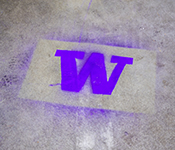 The National Science Foundation (NSF) recognized seven Allen School students as part of its 2023 Graduate Research Fellowship Program (GRFP) competition. The NSF GRFP supports students for their potential to demonstrate excellence and innovation in teaching and research early in their careers. The students — six graduate students and one undergraduate student — were recognized in the Comp/IS/Eng or Engineering categories. Read more →
The National Science Foundation (NSF) recognized seven Allen School students as part of its 2023 Graduate Research Fellowship Program (GRFP) competition. The NSF GRFP supports students for their potential to demonstrate excellence and innovation in teaching and research early in their careers. The students — six graduate students and one undergraduate student — were recognized in the Comp/IS/Eng or Engineering categories. Read more →
May 16, 2023
 Six Allen School students were recently named to the 2023 class of the Husky 100, an honor recognizing undergraduate and graduate students who are making the most of their time at the University of Washington. Husky 100 students make connections in and out of the classroom, making a positive impact on campus and in their communities. This year’s Allen School inductees are living those values, proving Huskies are stronger when in a pack. Read more →
Six Allen School students were recently named to the 2023 class of the Husky 100, an honor recognizing undergraduate and graduate students who are making the most of their time at the University of Washington. Husky 100 students make connections in and out of the classroom, making a positive impact on campus and in their communities. This year’s Allen School inductees are living those values, proving Huskies are stronger when in a pack. Read more →
May 8, 2023
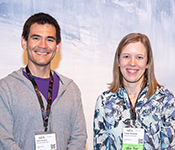 There was a time when cookies were exclusively considered something to be savored — back when chips referred to chocolate rather than silicon. Once “cookies” became synonymous with online tracking, privacy researchers weren’t so sweet on the concept. That includes Allen School professors Franziska Roesner and Tadayoshi Kohno, who investigated the online tracking ecosystem for their 2012 paper “Detecting and Defending Against Third-Party Tracking on the Web.” Roesner, Kohno and co-author David Wetherall received a Test of Time Award at NSDI 2023 for their influential work. Read more →
There was a time when cookies were exclusively considered something to be savored — back when chips referred to chocolate rather than silicon. Once “cookies” became synonymous with online tracking, privacy researchers weren’t so sweet on the concept. That includes Allen School professors Franziska Roesner and Tadayoshi Kohno, who investigated the online tracking ecosystem for their 2012 paper “Detecting and Defending Against Third-Party Tracking on the Web.” Roesner, Kohno and co-author David Wetherall received a Test of Time Award at NSDI 2023 for their influential work. Read more →
May 4, 2023
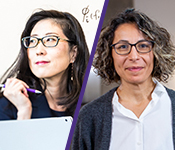 Single-cell genomics is revolutionizing biomedical research by enabling high-volume analysis of gene expression at the cellular level to understand the origins of disease and identify targets for potential treatment. To accelerate this progress, researchers are increasingly turning their attention to artificial intelligence (AI) tools to analyze these connections at scale. But the size and complexity of the resulting datasets, combined with noise and systematic biases in experimentation, make it difficult to build meaningful AI models from which to derive new biological insights. Professors Su-In Lee and Sara Mostafavi are working on solutions to the problem Read more →
Single-cell genomics is revolutionizing biomedical research by enabling high-volume analysis of gene expression at the cellular level to understand the origins of disease and identify targets for potential treatment. To accelerate this progress, researchers are increasingly turning their attention to artificial intelligence (AI) tools to analyze these connections at scale. But the size and complexity of the resulting datasets, combined with noise and systematic biases in experimentation, make it difficult to build meaningful AI models from which to derive new biological insights. Professors Su-In Lee and Sara Mostafavi are working on solutions to the problem Read more →
April 25, 2023
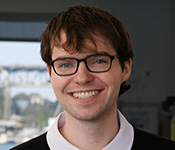 The 1939 movie “The Wizard of Oz” opens in black and white. After a tornado sweeps up her Kansas home and drops it with a thud, Dorothy, the story’s protagonist, opens the front door and is greeted by a world of color. “Toto, I have a feeling we’re not in Kansas anymore,” she says. Allen School senior Matt Deitke is not from Kansas, nor has he been to the Land of Oz. Yet he experienced a similar revelation, minus the intervention from Hollywood or Mother Nature. When Deitke was in high school, he spent long hours using Adobe Photoshop to manually — and tediously — colorize images for school projects. That changed when he encountered a different kind of technical wizardry, one that opened up a new world of color. Read more →
The 1939 movie “The Wizard of Oz” opens in black and white. After a tornado sweeps up her Kansas home and drops it with a thud, Dorothy, the story’s protagonist, opens the front door and is greeted by a world of color. “Toto, I have a feeling we’re not in Kansas anymore,” she says. Allen School senior Matt Deitke is not from Kansas, nor has he been to the Land of Oz. Yet he experienced a similar revelation, minus the intervention from Hollywood or Mother Nature. When Deitke was in high school, he spent long hours using Adobe Photoshop to manually — and tediously — colorize images for school projects. That changed when he encountered a different kind of technical wizardry, one that opened up a new world of color. Read more →
April 24, 2023
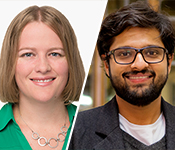 Nicola Dell (Photo by Jeff Weiner)
SIGCHI, the Association for Computing Machinery’s Special Interest Group on Computer-Human Interaction, has honored four researchers with ties to the University of Washington with 2023 SIGCHI Awards. Allen School alum Nicola (Nicki) Dell (Ph.D., ‘15), a leader in applying technologies to safeguard victims of technology-enabled intimate partner violence (IPV), received a Societal Impact Award, while Dhruv (DJ) Jain (Ph.D., ‘22), received an Outstanding Dissertation Award for his work on technologies to enhance… Read more →
Nicola Dell (Photo by Jeff Weiner)
SIGCHI, the Association for Computing Machinery’s Special Interest Group on Computer-Human Interaction, has honored four researchers with ties to the University of Washington with 2023 SIGCHI Awards. Allen School alum Nicola (Nicki) Dell (Ph.D., ‘15), a leader in applying technologies to safeguard victims of technology-enabled intimate partner violence (IPV), received a Societal Impact Award, while Dhruv (DJ) Jain (Ph.D., ‘22), received an Outstanding Dissertation Award for his work on technologies to enhance… Read more →
April 20, 2023
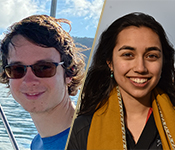 Jan Buzek (left) and Nuria Alina Chandra were named 2023 Goldwater Scholars.
Allen School undergraduates Jan Buzek and Nuria Alina Chandra are among five University of Washington students to be named 2023 Goldwater Scholars by the Barry M. Goldwater Scholarship and Excellence in Education Foundation. The Goldwater Scholars program recognizes and supports outstanding students who intend to pursue careers in mathematics, engineering and the natural sciences.
Buzek is a junior studying computer science and mathematics who counts Allen School… Read more →
Jan Buzek (left) and Nuria Alina Chandra were named 2023 Goldwater Scholars.
Allen School undergraduates Jan Buzek and Nuria Alina Chandra are among five University of Washington students to be named 2023 Goldwater Scholars by the Barry M. Goldwater Scholarship and Excellence in Education Foundation. The Goldwater Scholars program recognizes and supports outstanding students who intend to pursue careers in mathematics, engineering and the natural sciences.
Buzek is a junior studying computer science and mathematics who counts Allen School… Read more →
April 12, 2023
« Newer Posts — Older Posts »
 University of Washington professor Thomas Rothvoss, a member of the Allen School’s Theory of Computation group with a joint appointment in the UW Department of Mathematics, has received the 2023 Gödel Prize for “The matching polytope has exponential extension complexity.” In the paper, Rothvoss proved that linear programming — a core technique in combinatorial optimization for modeling a large class of problems that are polynomial-time solvable — cannot be used to solve the perfect matching problem in polynomial time. Read more →
University of Washington professor Thomas Rothvoss, a member of the Allen School’s Theory of Computation group with a joint appointment in the UW Department of Mathematics, has received the 2023 Gödel Prize for “The matching polytope has exponential extension complexity.” In the paper, Rothvoss proved that linear programming — a core technique in combinatorial optimization for modeling a large class of problems that are polynomial-time solvable — cannot be used to solve the perfect matching problem in polynomial time. Read more →

 University of Washington professor Thomas Rothvoss, a member of the Allen School’s Theory of Computation group with a joint appointment in the UW Department of Mathematics, has received the 2023 Gödel Prize for “The matching polytope has exponential extension complexity.” In the paper, Rothvoss proved that linear programming — a core technique in combinatorial optimization for modeling a large class of problems that are polynomial-time solvable — cannot be used to solve the perfect matching problem in polynomial time. Read more →
University of Washington professor Thomas Rothvoss, a member of the Allen School’s Theory of Computation group with a joint appointment in the UW Department of Mathematics, has received the 2023 Gödel Prize for “The matching polytope has exponential extension complexity.” In the paper, Rothvoss proved that linear programming — a core technique in combinatorial optimization for modeling a large class of problems that are polynomial-time solvable — cannot be used to solve the perfect matching problem in polynomial time. Read more →
 Few occasions better illustrate the human experience than sharing stories over a meal. Yet for people with motor impairments, the act of dining itself can invite undue pressure. Caregivers can get distracted while feeding their clients, who may feel self-conscious about interrupting the ongoing conversations to remind their caregiver to feed them a bite. A simple hangout with friends or family can turn into a source of potential embarrassment. The meal becomes more functional than social — and potentially, a process to be endured rather than a time for celebration.
That’s changing thanks to an innovative partnership between Allen School robotics researchers and the assistive technology nonprofit Tyler Schrenk Foundation. Read more →
Few occasions better illustrate the human experience than sharing stories over a meal. Yet for people with motor impairments, the act of dining itself can invite undue pressure. Caregivers can get distracted while feeding their clients, who may feel self-conscious about interrupting the ongoing conversations to remind their caregiver to feed them a bite. A simple hangout with friends or family can turn into a source of potential embarrassment. The meal becomes more functional than social — and potentially, a process to be endured rather than a time for celebration.
That’s changing thanks to an innovative partnership between Allen School robotics researchers and the assistive technology nonprofit Tyler Schrenk Foundation. Read more →
 From natural disasters to cyberattacks, events requiring rapid, coordinated responses of varying complexity and scale could be addressed more efficiently and effectively with the help of artificial intelligence. That’s the thinking behind two new National AI Research Institutes involving University of Washington researchers, including Allen School professors Simon Shaolei Du and Sewoong Oh, and funded by the National Science Foundation. Read more →
From natural disasters to cyberattacks, events requiring rapid, coordinated responses of varying complexity and scale could be addressed more efficiently and effectively with the help of artificial intelligence. That’s the thinking behind two new National AI Research Institutes involving University of Washington researchers, including Allen School professors Simon Shaolei Du and Sewoong Oh, and funded by the National Science Foundation. Read more →
 The National Science Foundation (NSF) recognized seven Allen School students as part of its 2023 Graduate Research Fellowship Program (GRFP) competition. The NSF GRFP supports students for their potential to demonstrate excellence and innovation in teaching and research early in their careers. The students — six graduate students and one undergraduate student — were recognized in the Comp/IS/Eng or Engineering categories. Read more →
The National Science Foundation (NSF) recognized seven Allen School students as part of its 2023 Graduate Research Fellowship Program (GRFP) competition. The NSF GRFP supports students for their potential to demonstrate excellence and innovation in teaching and research early in their careers. The students — six graduate students and one undergraduate student — were recognized in the Comp/IS/Eng or Engineering categories. Read more →
 Six Allen School students were recently named to the 2023 class of the Husky 100, an honor recognizing undergraduate and graduate students who are making the most of their time at the University of Washington. Husky 100 students make connections in and out of the classroom, making a positive impact on campus and in their communities. This year’s Allen School inductees are living those values, proving Huskies are stronger when in a pack. Read more →
Six Allen School students were recently named to the 2023 class of the Husky 100, an honor recognizing undergraduate and graduate students who are making the most of their time at the University of Washington. Husky 100 students make connections in and out of the classroom, making a positive impact on campus and in their communities. This year’s Allen School inductees are living those values, proving Huskies are stronger when in a pack. Read more →
 There was a time when cookies were exclusively considered something to be savored — back when chips referred to chocolate rather than silicon. Once “cookies” became synonymous with online tracking, privacy researchers weren’t so sweet on the concept. That includes Allen School professors Franziska Roesner and Tadayoshi Kohno, who investigated the online tracking ecosystem for their 2012 paper “Detecting and Defending Against Third-Party Tracking on the Web.” Roesner, Kohno and co-author David Wetherall received a Test of Time Award at NSDI 2023 for their influential work. Read more →
There was a time when cookies were exclusively considered something to be savored — back when chips referred to chocolate rather than silicon. Once “cookies” became synonymous with online tracking, privacy researchers weren’t so sweet on the concept. That includes Allen School professors Franziska Roesner and Tadayoshi Kohno, who investigated the online tracking ecosystem for their 2012 paper “Detecting and Defending Against Third-Party Tracking on the Web.” Roesner, Kohno and co-author David Wetherall received a Test of Time Award at NSDI 2023 for their influential work. Read more →
 Single-cell genomics is revolutionizing biomedical research by enabling high-volume analysis of gene expression at the cellular level to understand the origins of disease and identify targets for potential treatment. To accelerate this progress, researchers are increasingly turning their attention to artificial intelligence (AI) tools to analyze these connections at scale. But the size and complexity of the resulting datasets, combined with noise and systematic biases in experimentation, make it difficult to build meaningful AI models from which to derive new biological insights. Professors Su-In Lee and Sara Mostafavi are working on solutions to the problem Read more →
Single-cell genomics is revolutionizing biomedical research by enabling high-volume analysis of gene expression at the cellular level to understand the origins of disease and identify targets for potential treatment. To accelerate this progress, researchers are increasingly turning their attention to artificial intelligence (AI) tools to analyze these connections at scale. But the size and complexity of the resulting datasets, combined with noise and systematic biases in experimentation, make it difficult to build meaningful AI models from which to derive new biological insights. Professors Su-In Lee and Sara Mostafavi are working on solutions to the problem Read more →
 The 1939 movie “The Wizard of Oz” opens in black and white. After a tornado sweeps up her Kansas home and drops it with a thud, Dorothy, the story’s protagonist, opens the front door and is greeted by a world of color. “Toto, I have a feeling we’re not in Kansas anymore,” she says. Allen School senior Matt Deitke is not from Kansas, nor has he been to the Land of Oz. Yet he experienced a similar revelation, minus the intervention from Hollywood or Mother Nature. When Deitke was in high school, he spent long hours using Adobe Photoshop to manually — and tediously — colorize images for school projects. That changed when he encountered a different kind of technical wizardry, one that opened up a new world of color. Read more →
The 1939 movie “The Wizard of Oz” opens in black and white. After a tornado sweeps up her Kansas home and drops it with a thud, Dorothy, the story’s protagonist, opens the front door and is greeted by a world of color. “Toto, I have a feeling we’re not in Kansas anymore,” she says. Allen School senior Matt Deitke is not from Kansas, nor has he been to the Land of Oz. Yet he experienced a similar revelation, minus the intervention from Hollywood or Mother Nature. When Deitke was in high school, he spent long hours using Adobe Photoshop to manually — and tediously — colorize images for school projects. That changed when he encountered a different kind of technical wizardry, one that opened up a new world of color. Read more →


